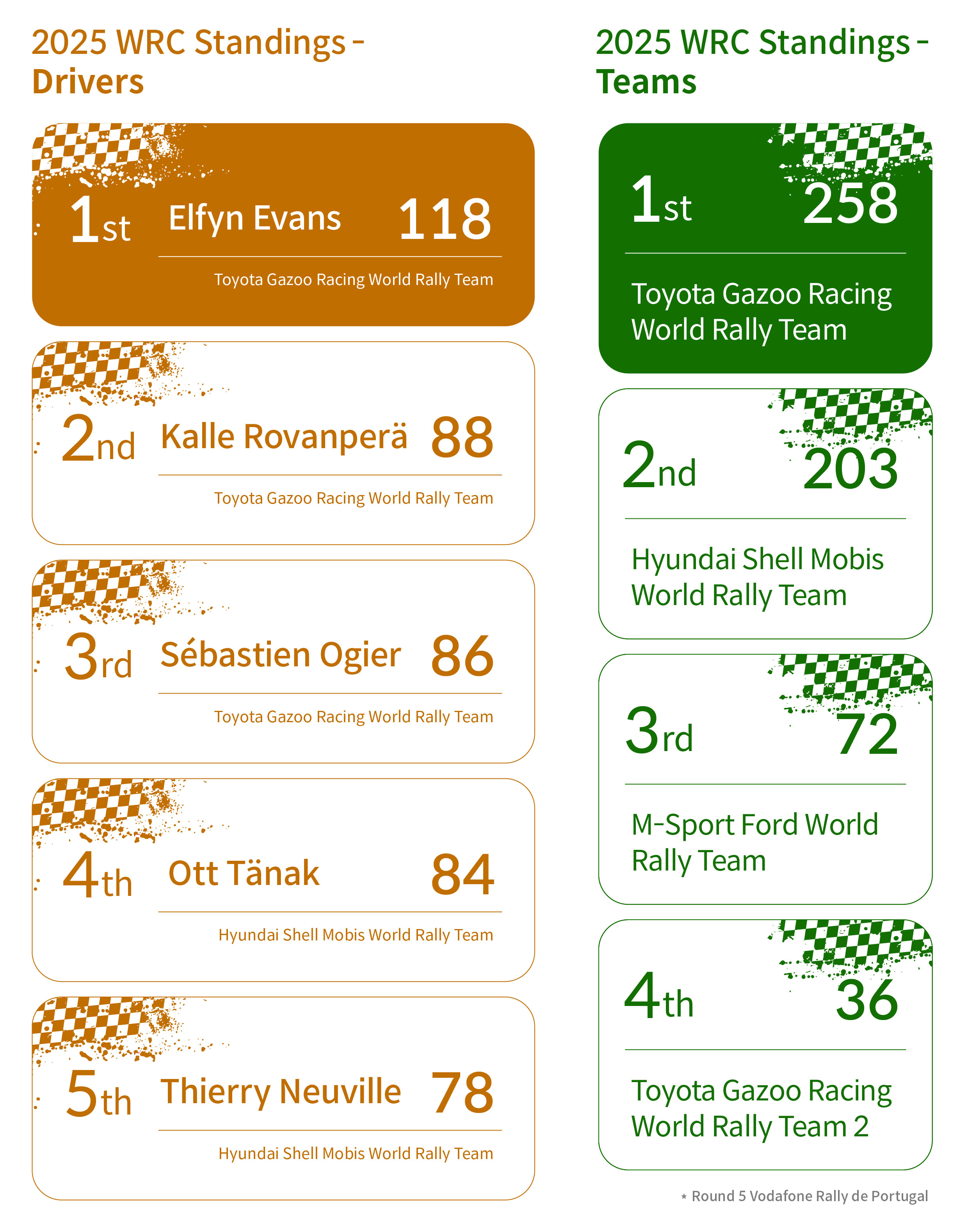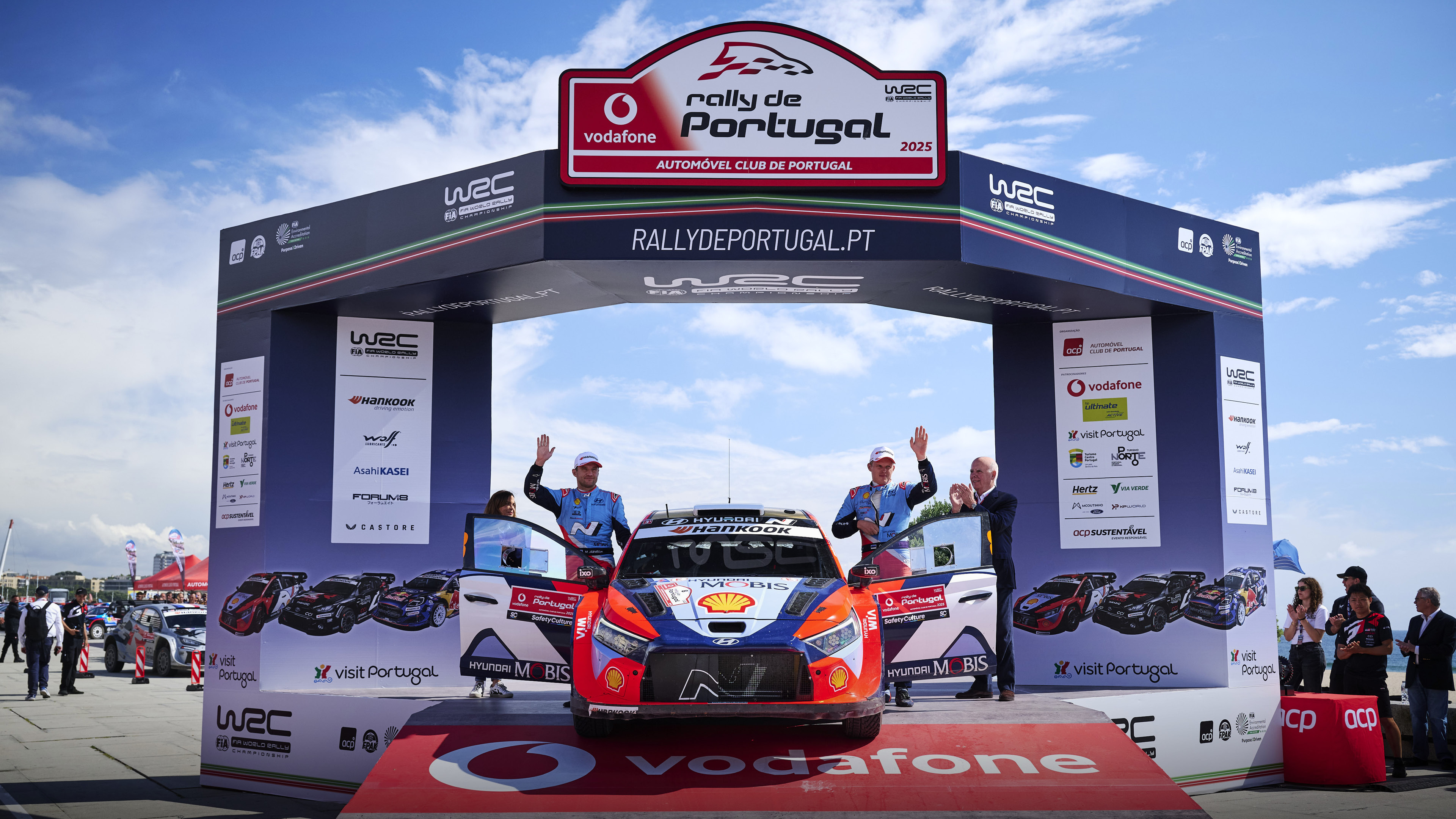
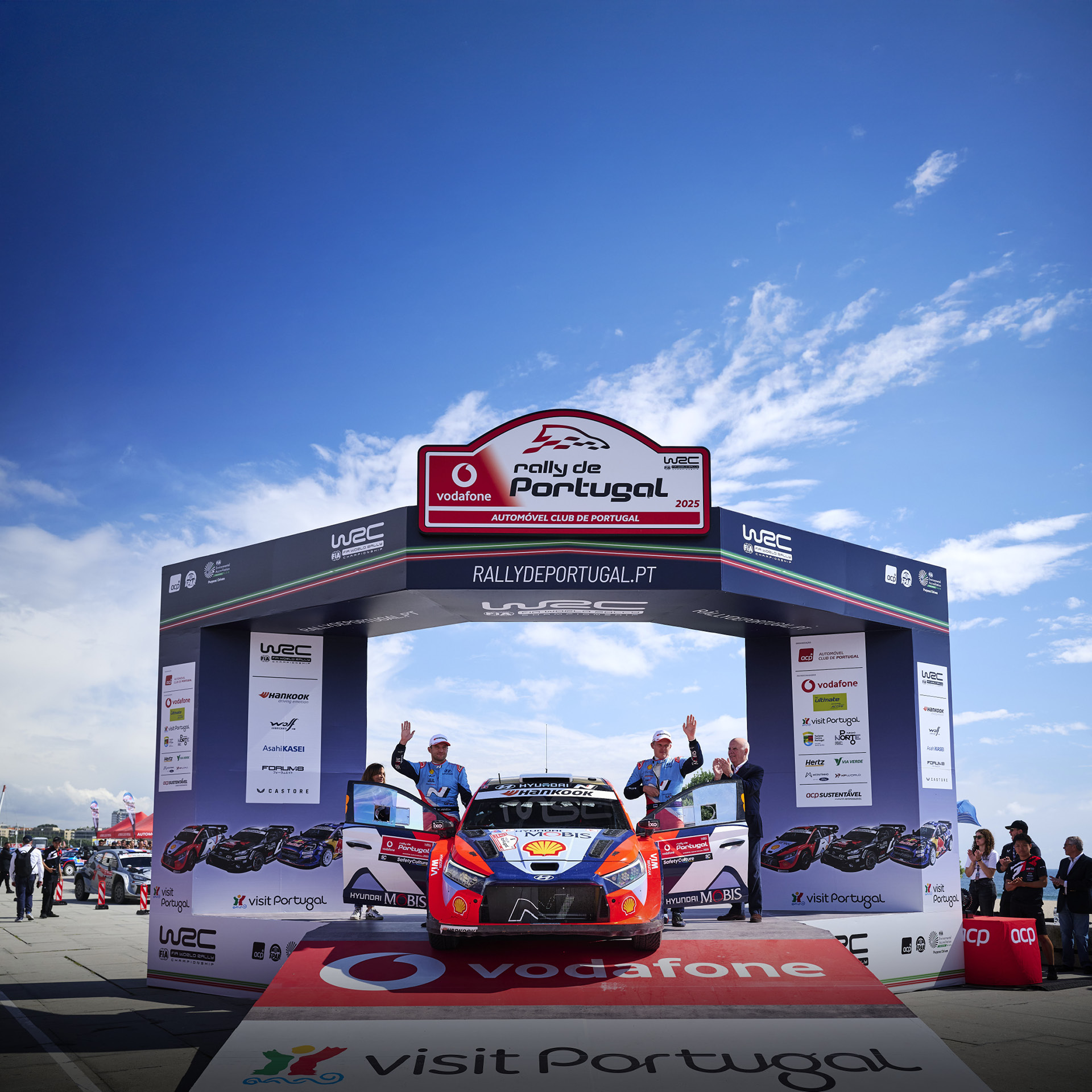


2025.06.05 Hyundai Motorsport Team
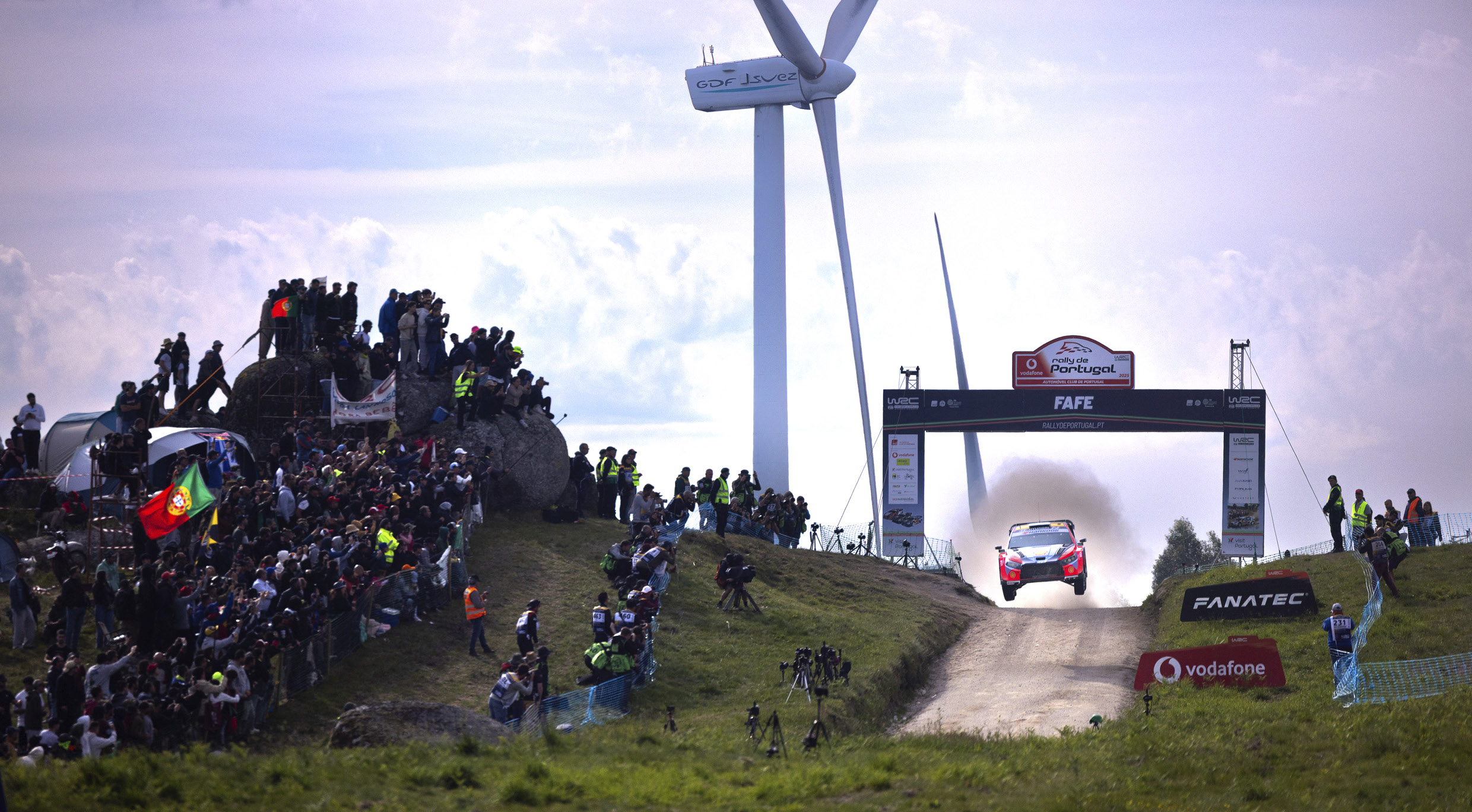
Following the tarmac-based Rally Islas Canarias (Round 4), this year’s WRC heads into a grueling stretch of seven consecutive gravel rallies, beginning with Portugal and running through to Chile. Among these, Rounds 5 (Portugal), 6 (Italy), and 7 (Greece) are notorious for their punishing terrain and searing heat—testing both car durability and driver concentration.
First held in 1967, Rally Portugal has been part of the WRC calendar since its debut season in 1973. Though once a mix of asphalt and gravel stages, it now runs exclusively on gravel and has earned a reputation as one of the toughest events in the series.
Thousands of passionate fans can be seen lining the stages in Portugal. Video: WRC (https://www.wrc.com)
Known for its diehard rally fans, Portugal’s event was once infamous for the sheer number of spectators encroaching on the stages—particularly during the wild Group B era. The 1986 edition even saw one of the era’s most tragic crashes. Despite the risks, Rally Portugal’s popularity has never waned.
The rally dropped off the WRC calendar between 2002 and 2006 but returned with a new base in Faro, Algarve. It moved back to its traditional home in Matosinhos in 2015 and has since continued to thrive—earning the title of "Best Rally of the Year" five times.
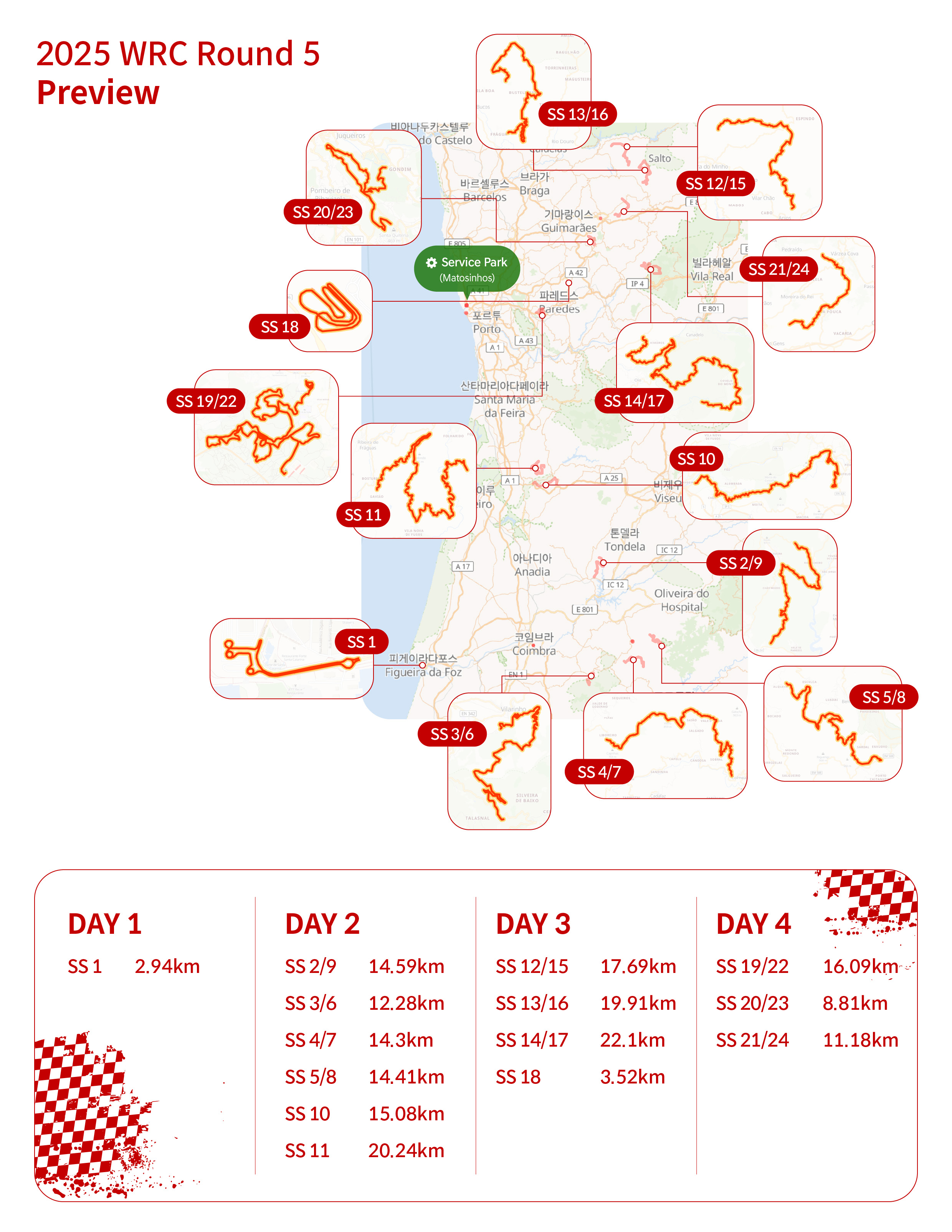
Today’s Rally Portugal runs through northern and central regions of the country. Compared to Italy and Greece, it offers higher-speed sections, but the course is riddled with blind corners hid-den behind hill crests. The top layer of soft sandy gravel hides a hard rock base, meaning grip levels change constantly. Add the heat, and tire wear becomes a serious issue.
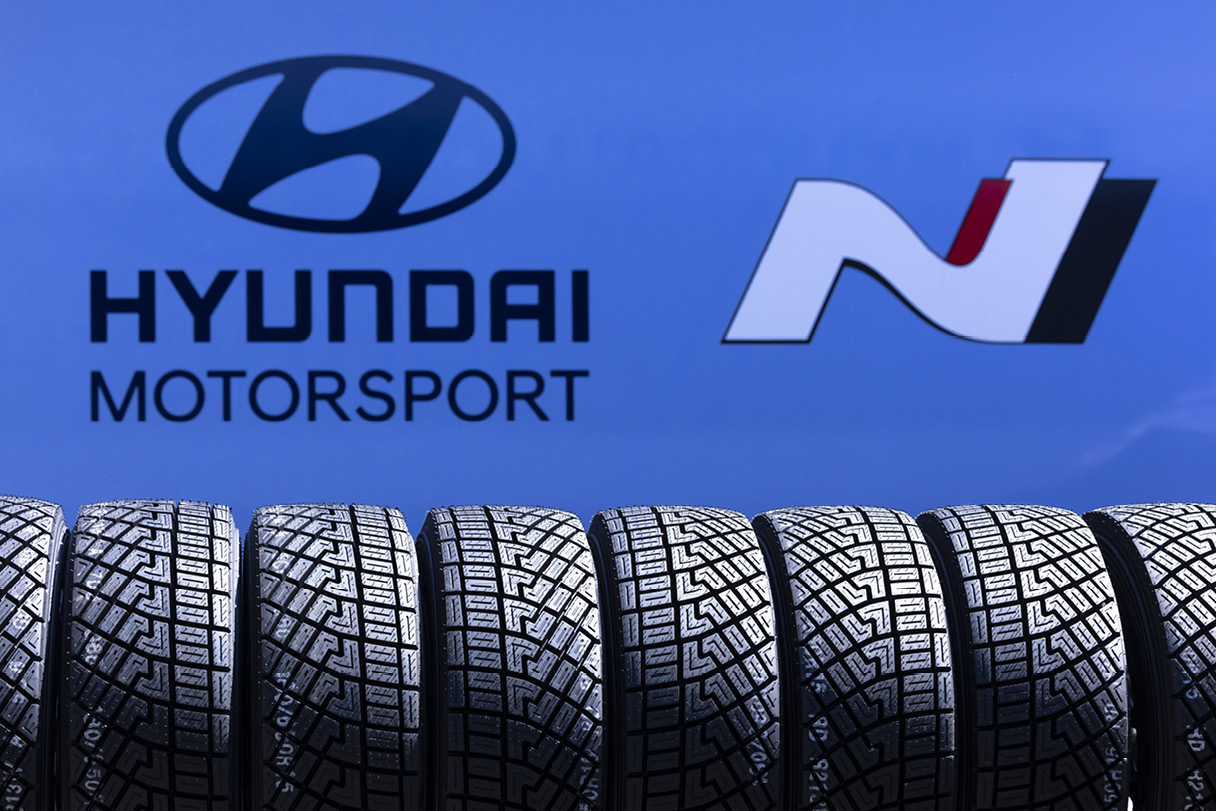
Hankook’s Dynapro R213 gravel tire—originally debuted in Kenya’s Safari Rally—was updated for this event. The pattern has been slightly modified for increased robustness, especially with even rougher rallies in Italy and Greece on the horizon.
With cockpit temps soaring and no air conditioning allowed during stages, Rally Portugal turns every car into a rolling sauna. Many teams, including Hyundai, applied heat-reflective window films. Hyundai even fitted a gold-colored roof to its i20 N Rally1 to reflect sunlight. Toyota switched its body color from black to silver for the same reason. Hyundai and Toyota stuck with their previous driver lineups, while M-Sport Ford expanded its entry from two to four cars.
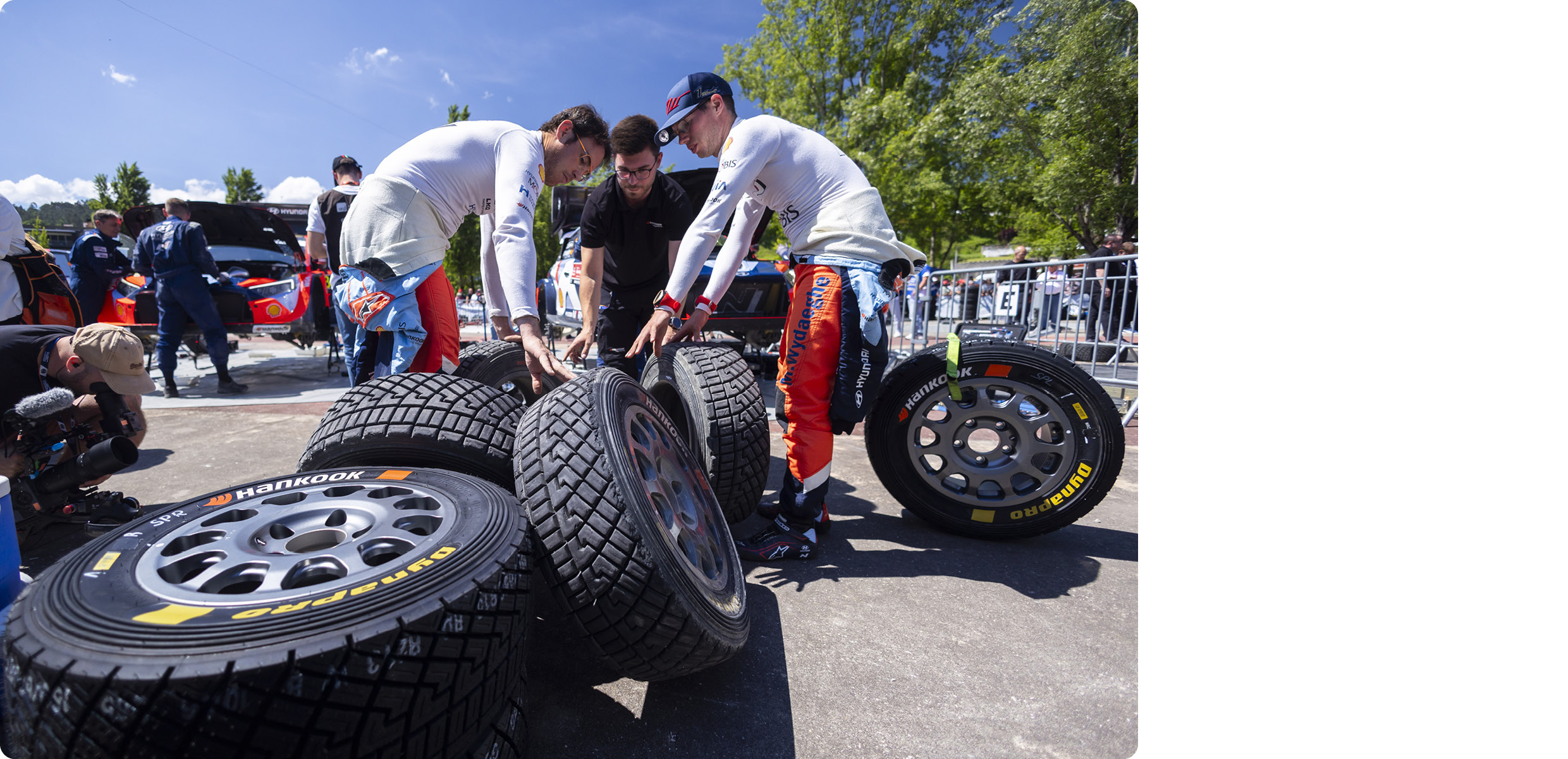
2018 Portugal Rally winner Thierry Neuville came off a frustrating seventh-place finish in the Canaries. Heading into Portugal, Neuville had 59 championship points—50 behind Toyota’s Elfyn Evans and 7 behind Kalle Rovanperä. “We need to be stronger than the Toyotas and we need to outscore Elfyn,” said Neuville, “he has a big lead in the championship and we haven’t been able to fight back as much as we would have hoped, so he will be our main target to beat in Portugal along with Kalle.”
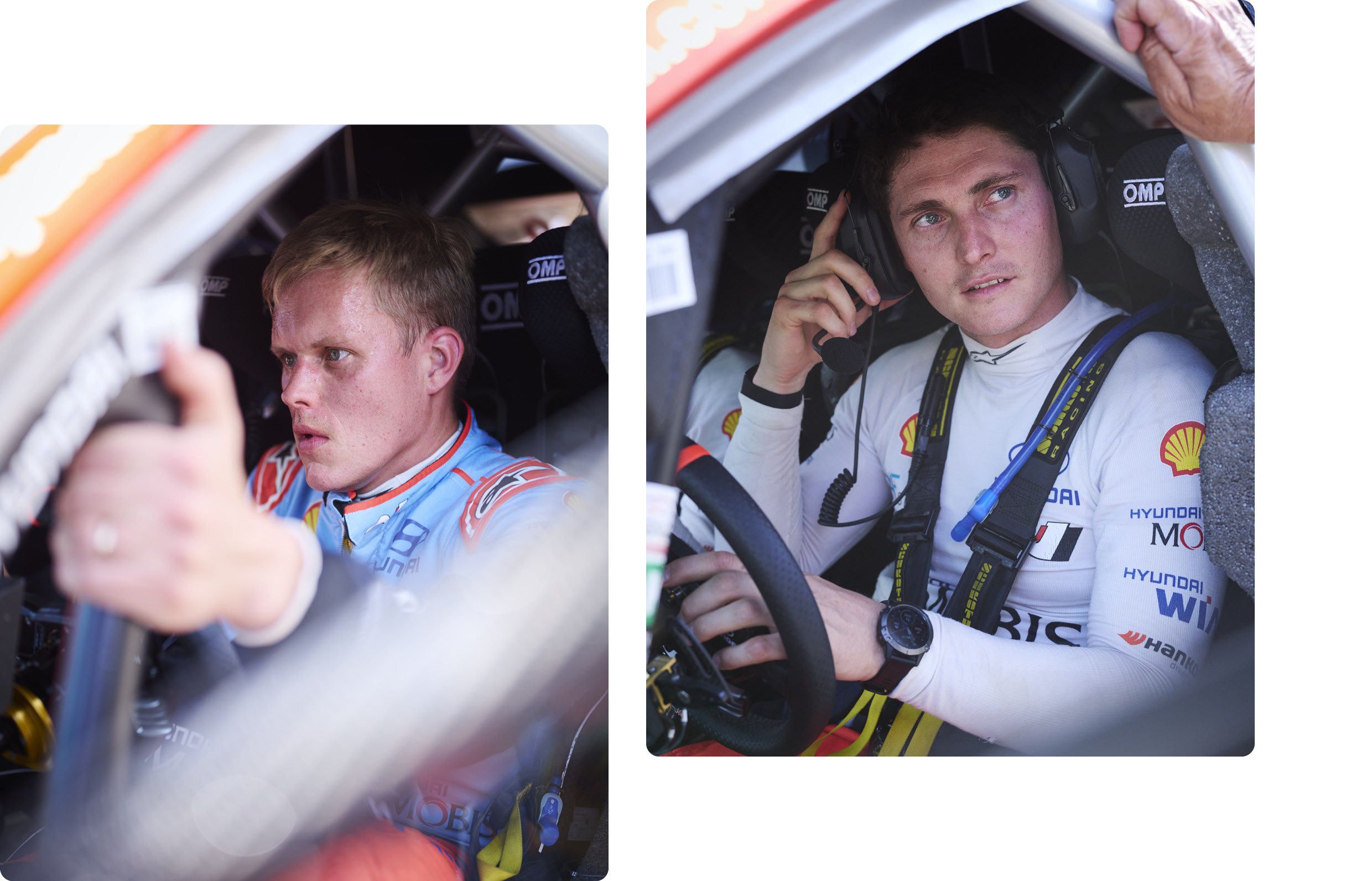
Ott Tänak and Adrien Fourmaux entered Round 5 sitting fifth and sixth in the championship with 57 and 44 points, respectively. Tänak won in Portugal in 2019, while Fourmaux’s best result was fourth last year.
Hyundai’s updated i20 N Rally1, which debuted in Sweden, faced its first true gravel test here. Sweden was a full-snow rally, while the Canaries featured clean tarmac. Both events offered unique challenges, compounded by the new Hankook tires. The revised car-tire combo hadn’t gelled well, resulting in underwhelming performances. Portugal was viewed as a litmus test for the upgrades designed to improve gravel performance.
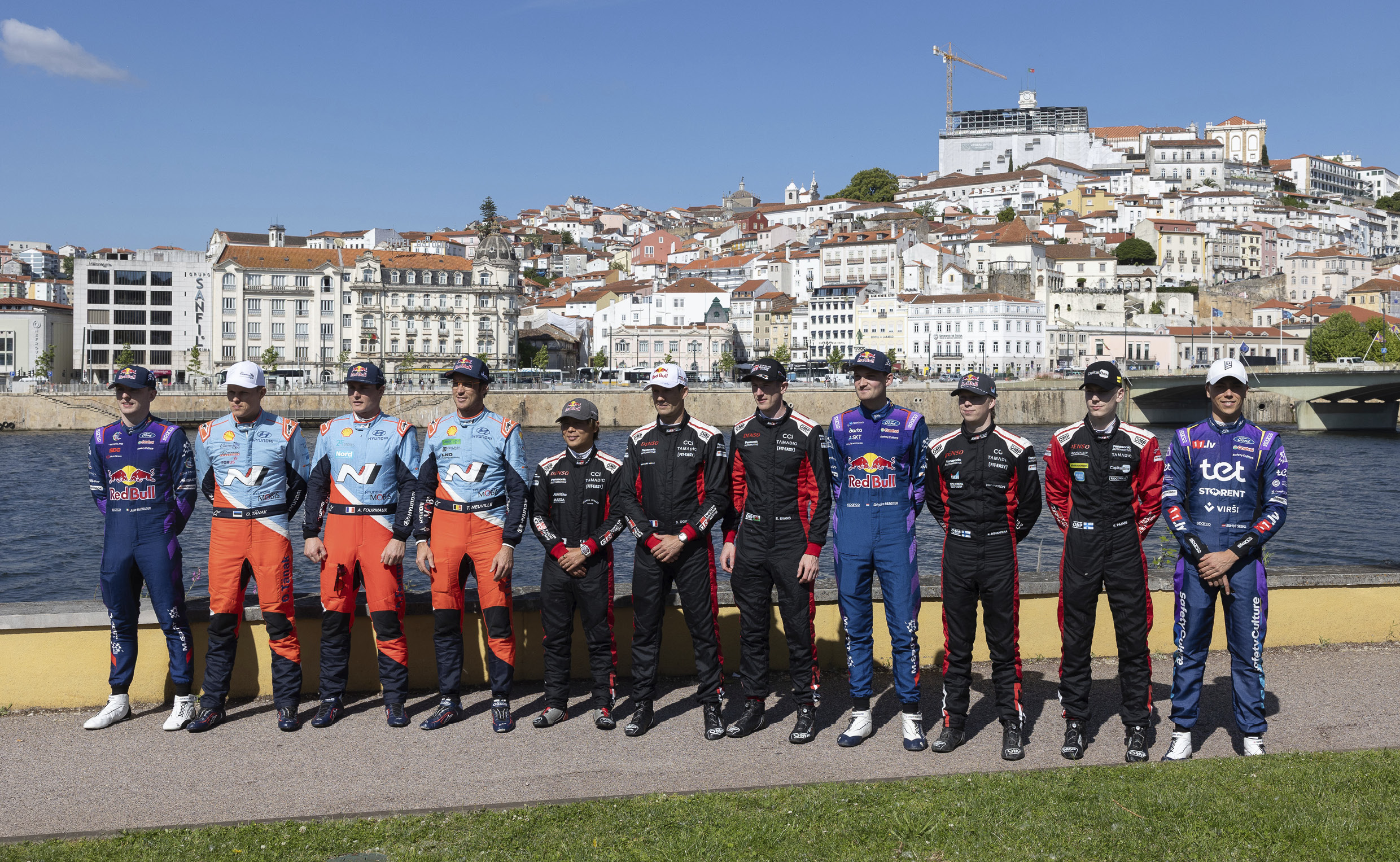
Toyota again fielded Evans, Rovanperä, Sébastien Ogier, and Takamoto Katsuta, with Sami Pajari running separately. Evans won Portugal in 2021; Rovanperä triumphed in 2022 and 2023; and Ogier has six Portugal wins under his belt. Katsuta, like Fourmaux, has yet to crack the podium.
M-Sport Ford ad-ded Grégoire Munster, Josh McErlean, part-time Latvian driver Mārtiņš Sesks (back after Sweden), and 55-year-old Portuguese businessman and enthusiast Diogo Salvi, who rented a Puma Rally1 for his home event.
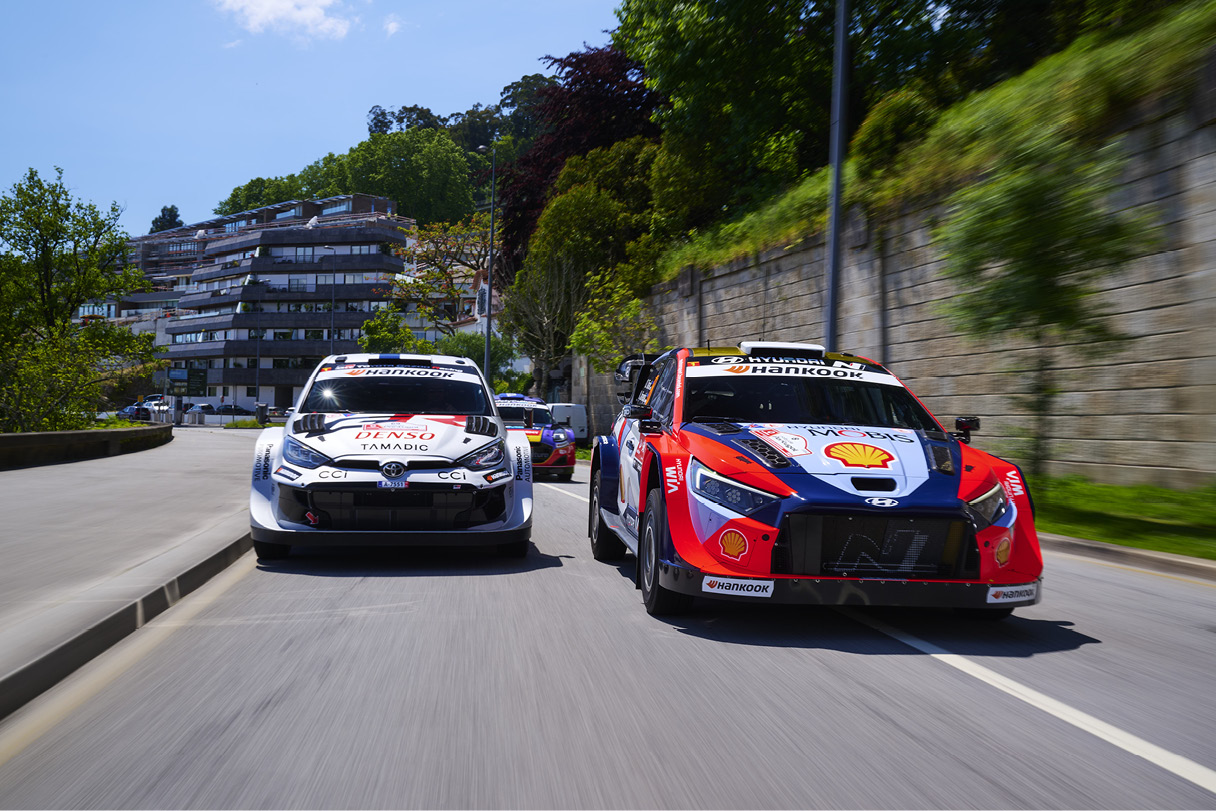
WRC2 saw a massive 45-car entry list, including early season winners Oliver Solberg, Yohan Rossel, and Gus Greensmith. Other title contenders included Fabrizio Zaldivar, Jan Solans, and Roope Korhonen. Former Hyundai driver Pierre-Louis Loubet also entered WRC2 with Ford.
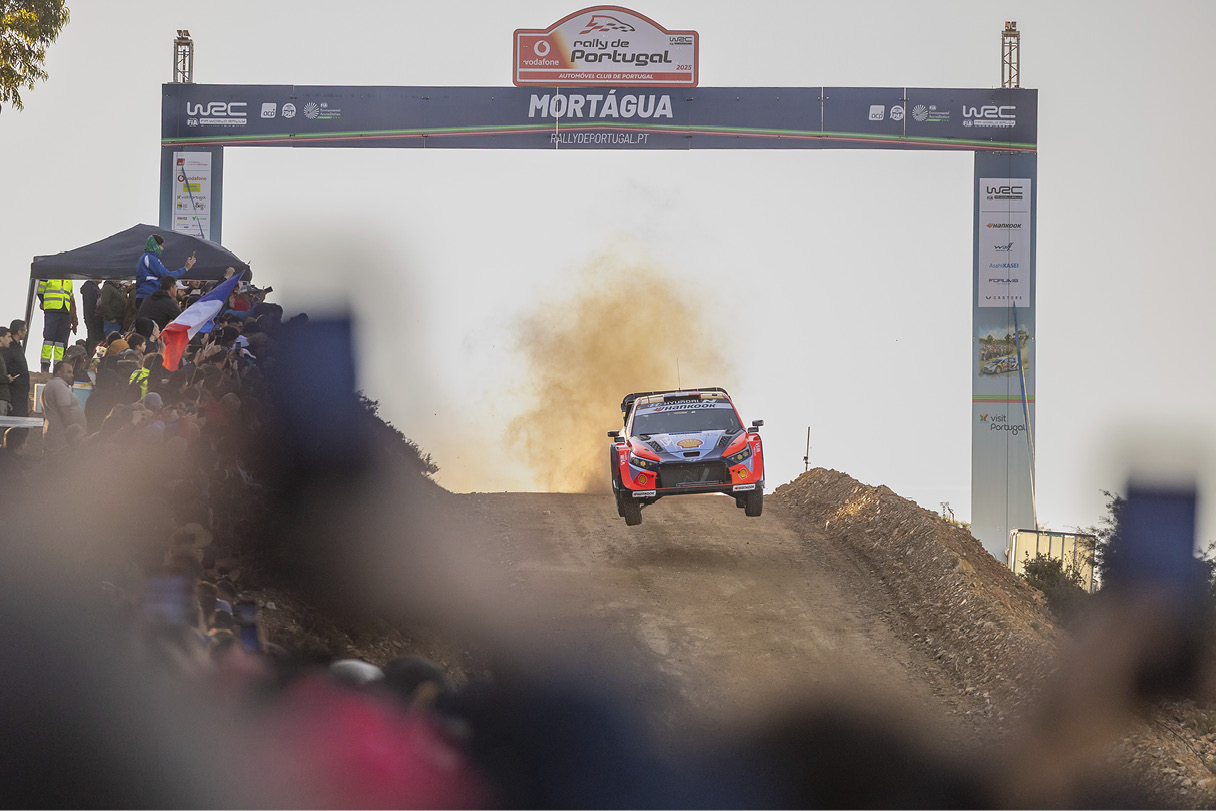
Thursday, May 15 at 7:05 p.m.—SSS1 in Figueira da Foz kicked off the rally along a seaside parking lot, set against the stunning backdrop of the Atlantic Ocean and the 17th-century Santa Catarina Fortress. In the short 2.94 km stage, Elfyn Evans set the pace out front, with Sébastien Ogier close behind. Tänak, Fourmaux, and Neuville followed in third through fifth.
Friday’s full gravel stages began with SS2 Mortágua, followed by Lousã, Góis, and Arganil—each run twice before wrapping up with Águeda-Sever and Sever-Albergaria. The day’s 10 stages covered 146.48 km.
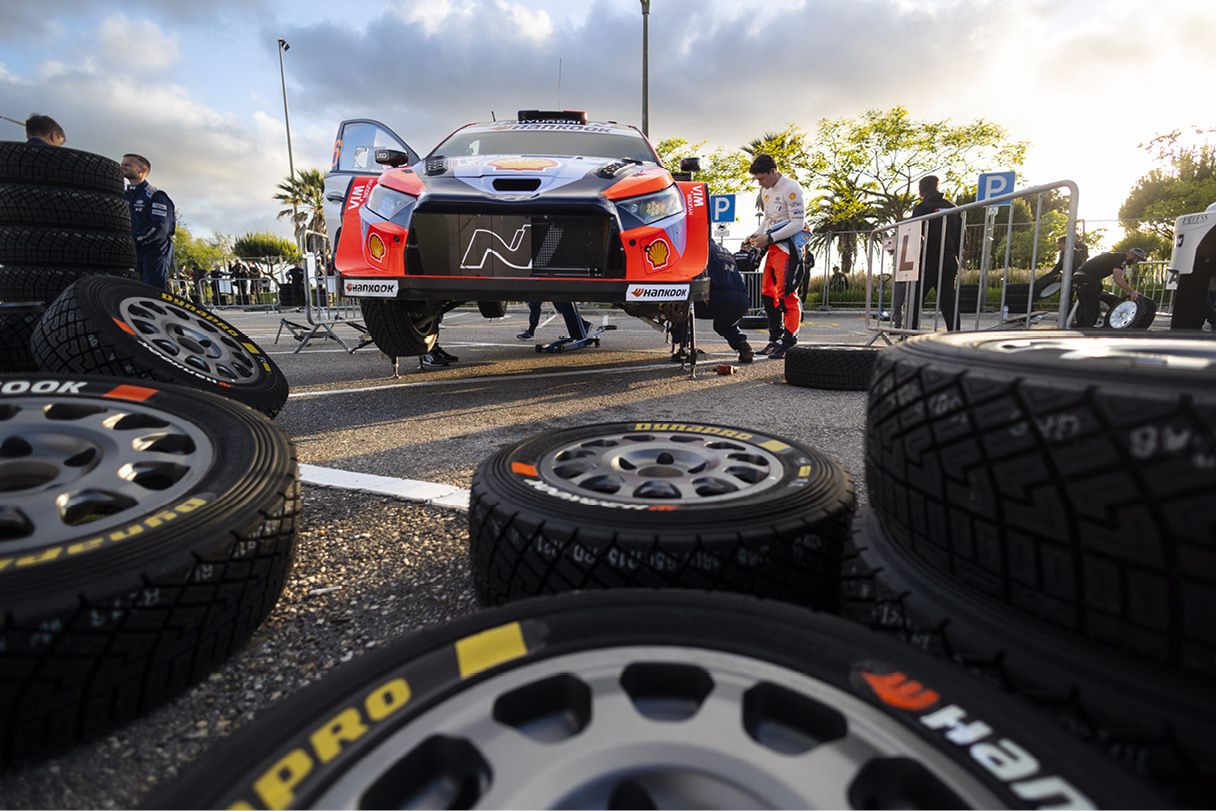
Unlike last year, this year’s Friday stages included a tire fitting stop after SS5 and a remote service park after SS8. With the first stage at 7:35 a.m. and the final one at 7:20 p.m., the grueling schedule left drivers with barely enough time to eat or rest.
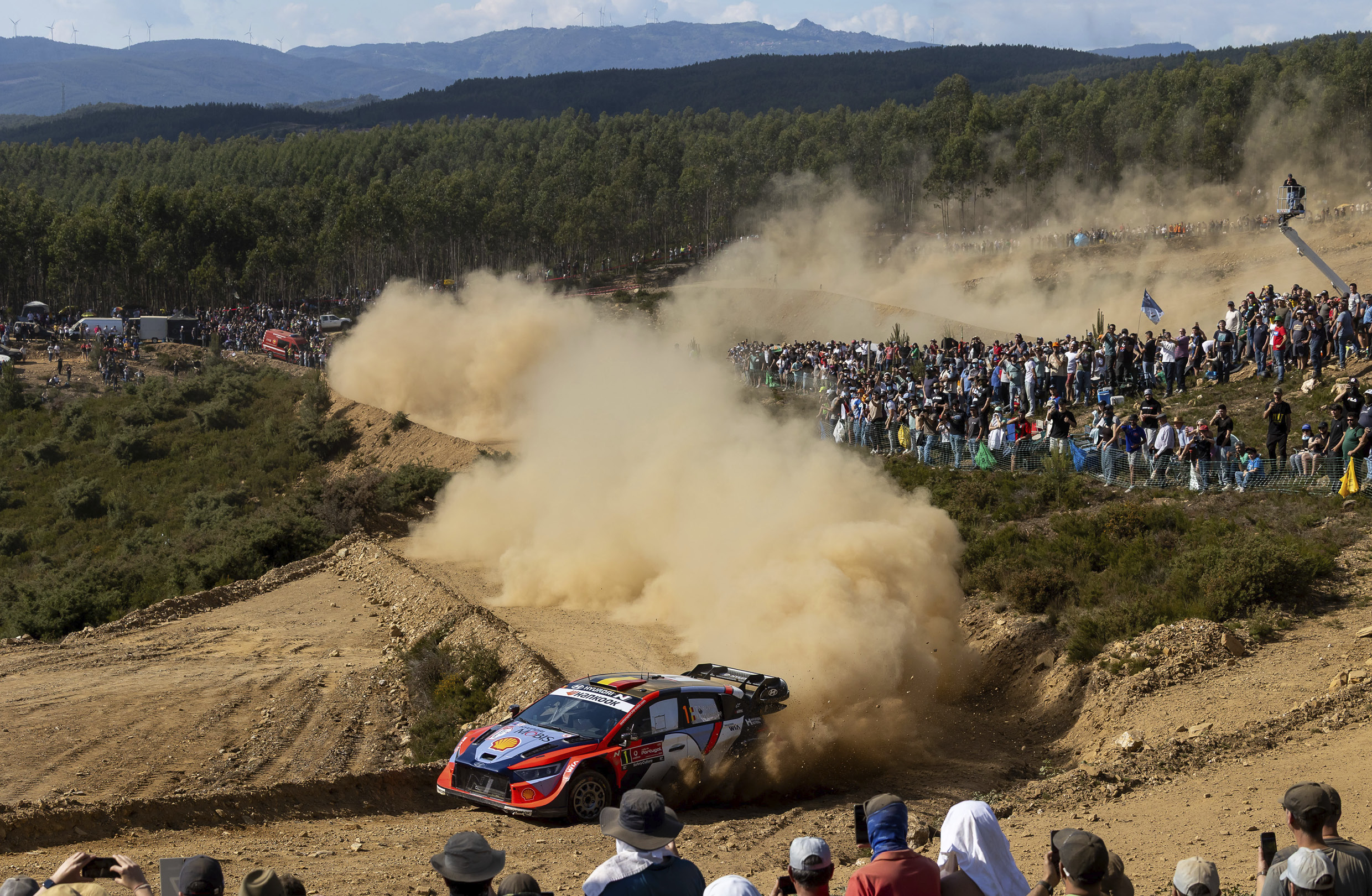
The opening stage in Mortágua featured a well-groomed gravel course lined with eucalyptus trees, demanding a perfect blend of speed and precision. Its technical nature made it a stage where time gaps could grow quickly if drivers lost their rhythm. SS3 Lousã returned to the WRC for the first time since 2019. This classic forest stage is known for its technical difficulty, especially the thrilling string of hairpins in the second half as the road descends into a village.
SS4 Góis, with its stunning scenery and dramatic flair, followed the same layout as last year. But there was no time to admire the view—this high-speed stage demanded absolute concentration. SS11 Sever-Albergaria, run late Friday, was inspired by classic 1970s Portuguese rally routes and brought the action back to the Albergaria-a-Velha region. Technically complex yet highly visible for spectators, it drew large and enthusiastic crowds.
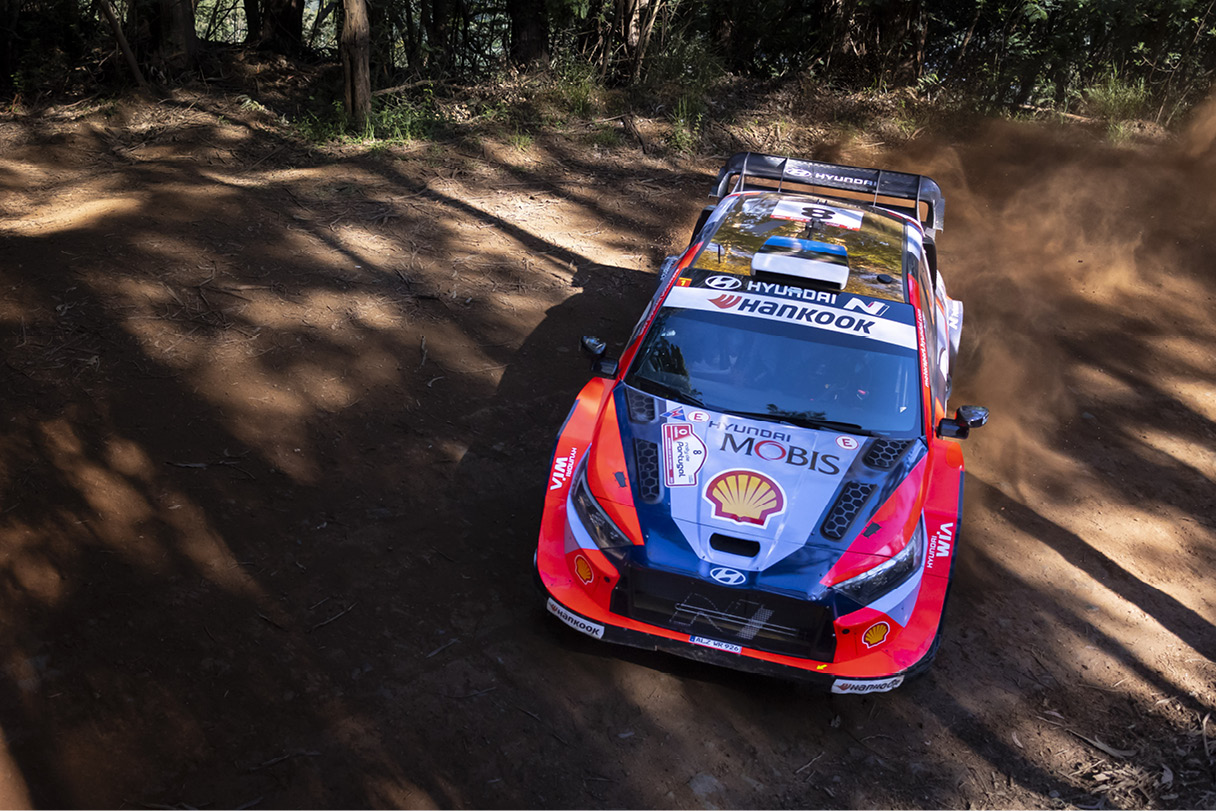
Tänak jumped into the overall lead right from the opening stage, edging out Rovanperä by just 0.2 seconds for the fastest time. Meanwhile, Sesks—who had topped the timesheets in the pre-event shakedown—ran into trouble with a puncture on the opener that disrupted his rhythm. Ogier struggled to find pace with a less-than-ideal setup, and Neuville lost valuable seconds after a half-spin.
Tänak kept the momentum going, setting back-to-back fastest times through SS3 Lousã. But then it was Fourmaux’s turn to shine—he snatched stage wins in SS4 and SS5, leapfrogging Evans and Rovanperä to close the gap to Tänak to just 0.5 seconds. Unfortunately, his charge for a maiden Portugal win ended in heartbreak. In SS8, while running Arganil for the second time, his front wheel clipped a hid-den rock on the inside of a corner, breaking the suspension and forcing him to retire. Neuville, who had been complaining about poor grip and responsiveness, finally found some form—claiming his first stage win of the event in SS8. Tänak responded by taking SS9 and SS11.
Tänak clinched his 400th career stage win in Portugal. Video: WRC (https://www.wrc.com)
By the end of Friday, Tänak was still holding the overall lead, having claimed four stage wins that day—pushing his career total past the 400 mark. "Not good for the team, but yeah. I tried to have a good stage," Tanak said, "It's been demanding, especially the second loop. We couldn't really find the sweetspot and we were a bit struggling. But the last two ones were clean stages."
Ogier trailed by 7 seconds in second place overall, followed by Katsuta and Rovanperä. After an early mistake dropped him to eighth, Neuville fought back, overtaking Evans and Pajari to climb into fifth. Evans, who had the unenviable task of running first on the road and sweeping the gravel, ended the day in seventh. In WRC2, Solberg led the pack, with Gryazin, Greensmith, and Rossel in hot pursuit.
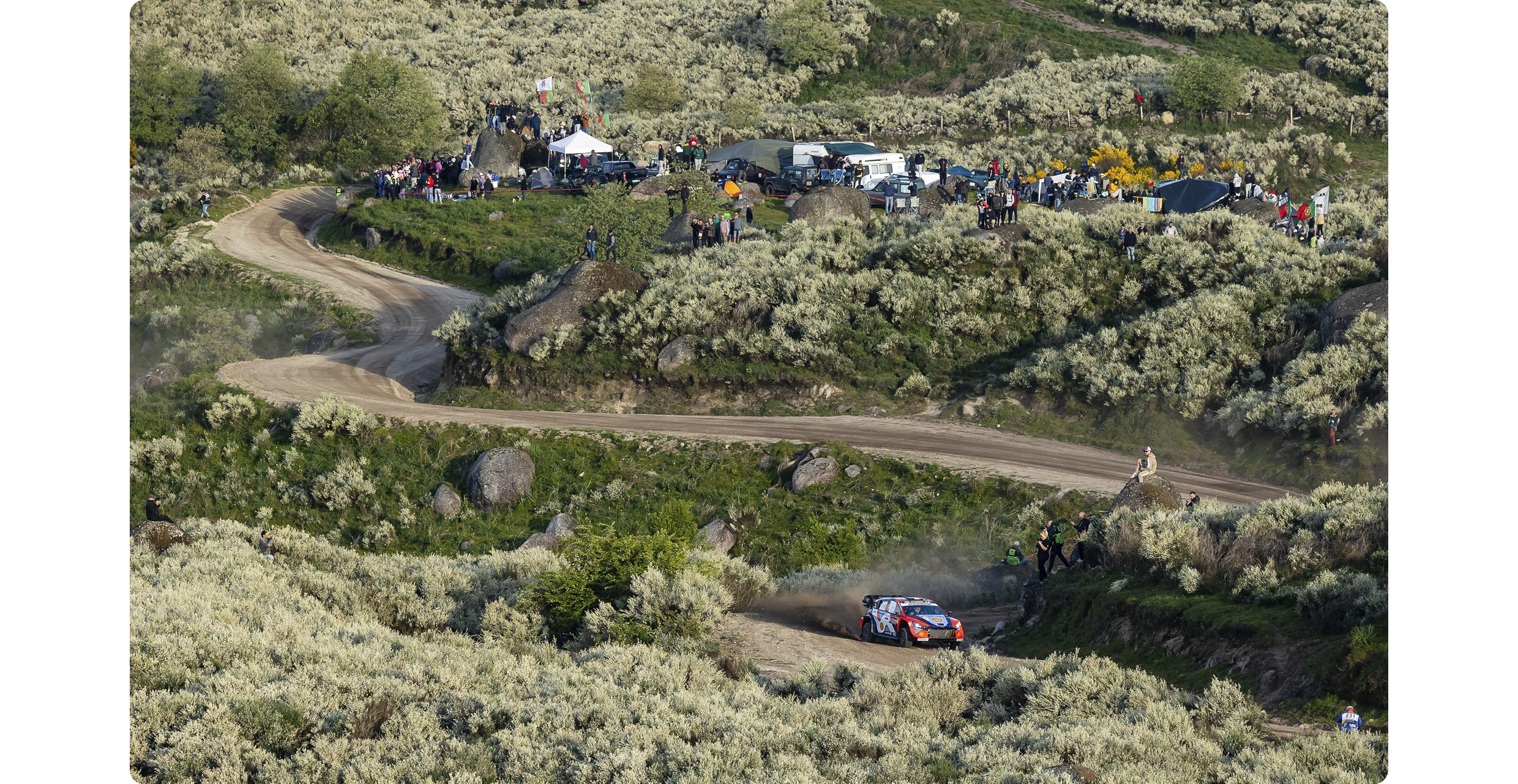
Saturday, May 17 — The day’s action kicked off in Vieira do Minho and carried on through Cabeceiras de Basto and Amarante, with all three stages run twice, morning and afternoon. The day concluded with the 3.52 km Lousada super special in the evening. In total, SS12 to SS18 covered 122.92 km.
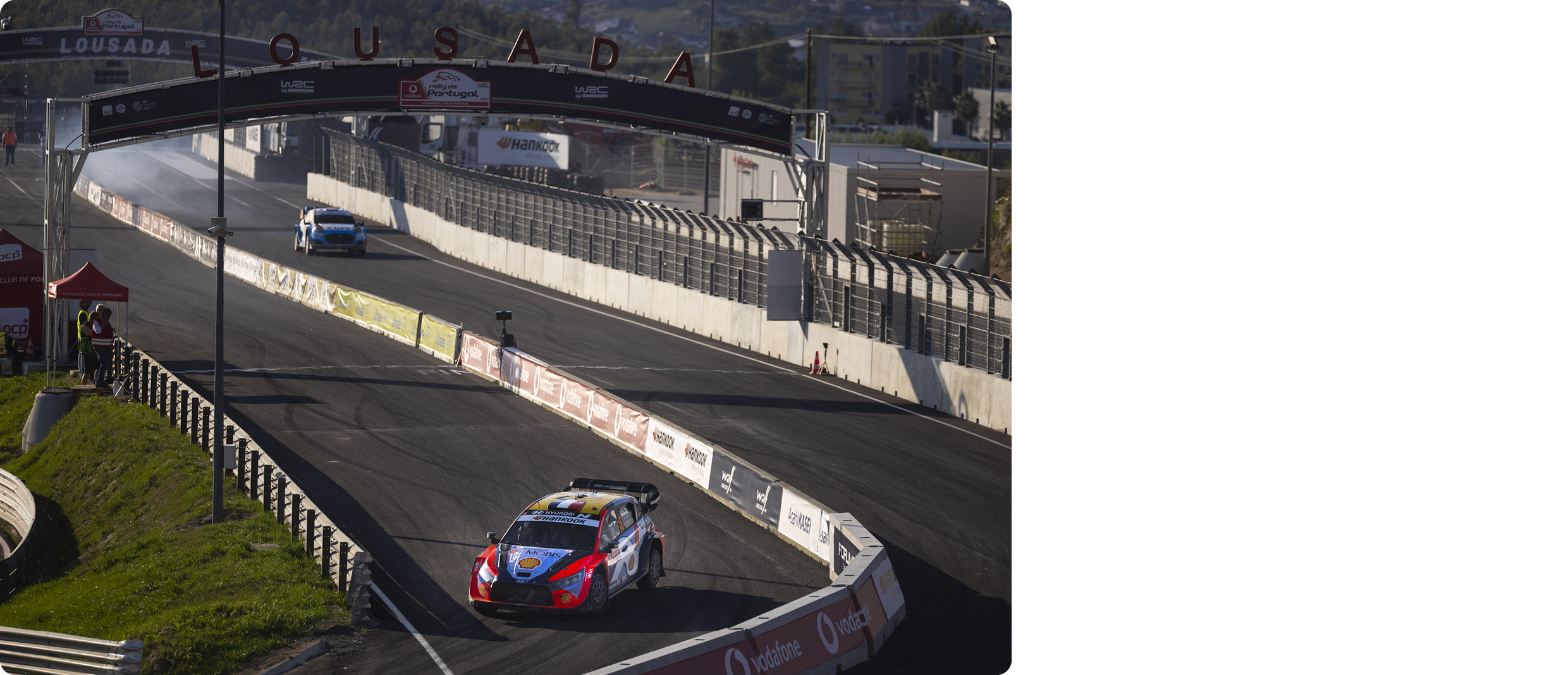
Cabeceiras de Basto is considered one of the most scenic stages of Rally Portugal. Despite being shortened from last year, the 22.1 km Amarante stage remained the longest of the event. It drew massive crowds once again to iconic spots like the Fridão and Safina hairpins. The fan-favorite Lousada stage, which runs on a rallycross-style circuit, was extended slightly from 3.36 to 3.52 km and featured thrilling side-by-side starts that brought the crowd to its feet.
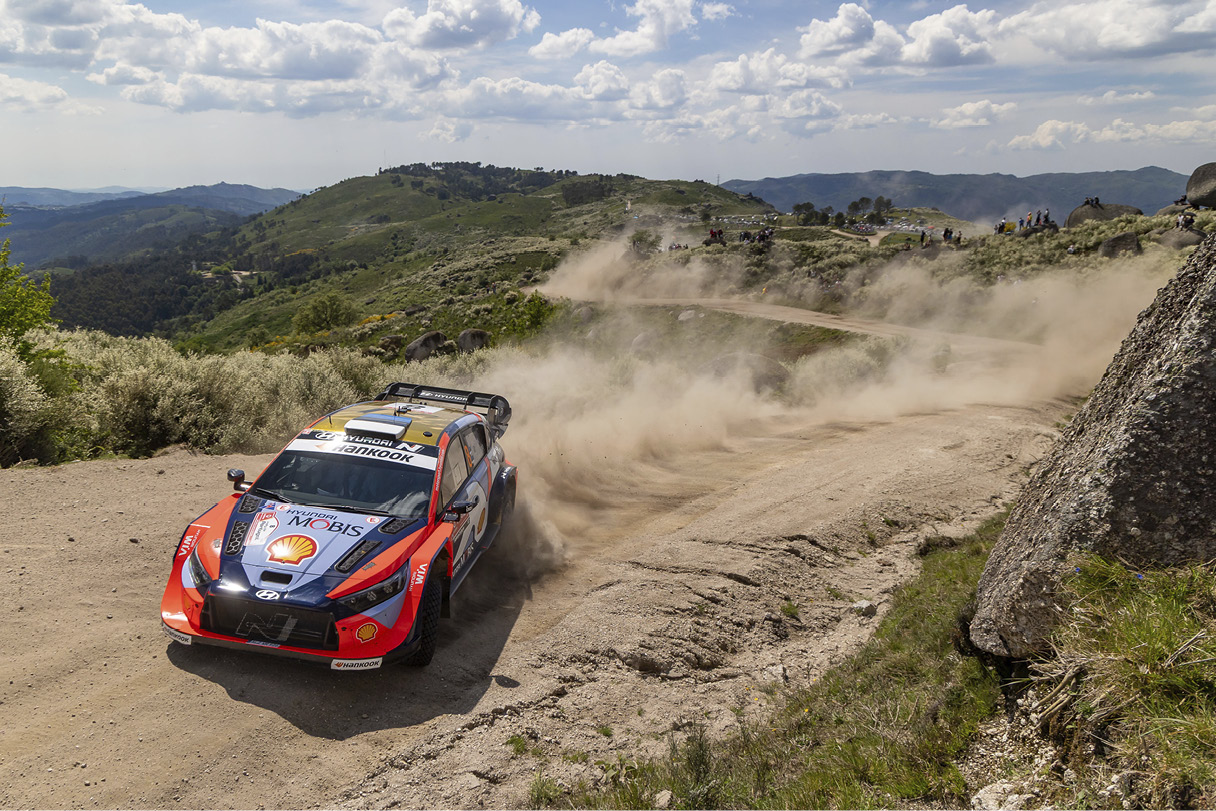
Ogier opened the day by posting consecutive stage wins from SS12, cutting his gap to leader Tänak down to just two seconds. But Tänak responded fiercely, overcoming tire damage to claim SS14 through SS16 and stretch his lead back to 13.9 seconds. Rovanperä overtook Katsuta in SS14 to move into third overall, while Neuville struggled with overheated soft tires, dashing hopes of a podium finish.
Tänak’s run hit trouble in SS17 when a steering failure forced him to wrestle the car to the finish. Video: WRC (https://www.wrc.com)
Tänak’s charge toward his first win of the season hit a major setback in SS17. On the rocky stage surface, he suffered a power steering failure and had to muscle the wheel without assistance. His pace dropped, allowing the Toyota duo to pounce—Ogier moved into the lead, Rovanperä to second. By the end of Saturday, Ogier topped the standings with a 27.6-second advantage over Rovanperä. Tänak dropped to third, just 8.5 seconds behind, while Neuville trailed Tänak by the same margin in fourth. Katsuta was close behind in fifth, only 2.2 seconds back. Solberg continued to lead WRC2.
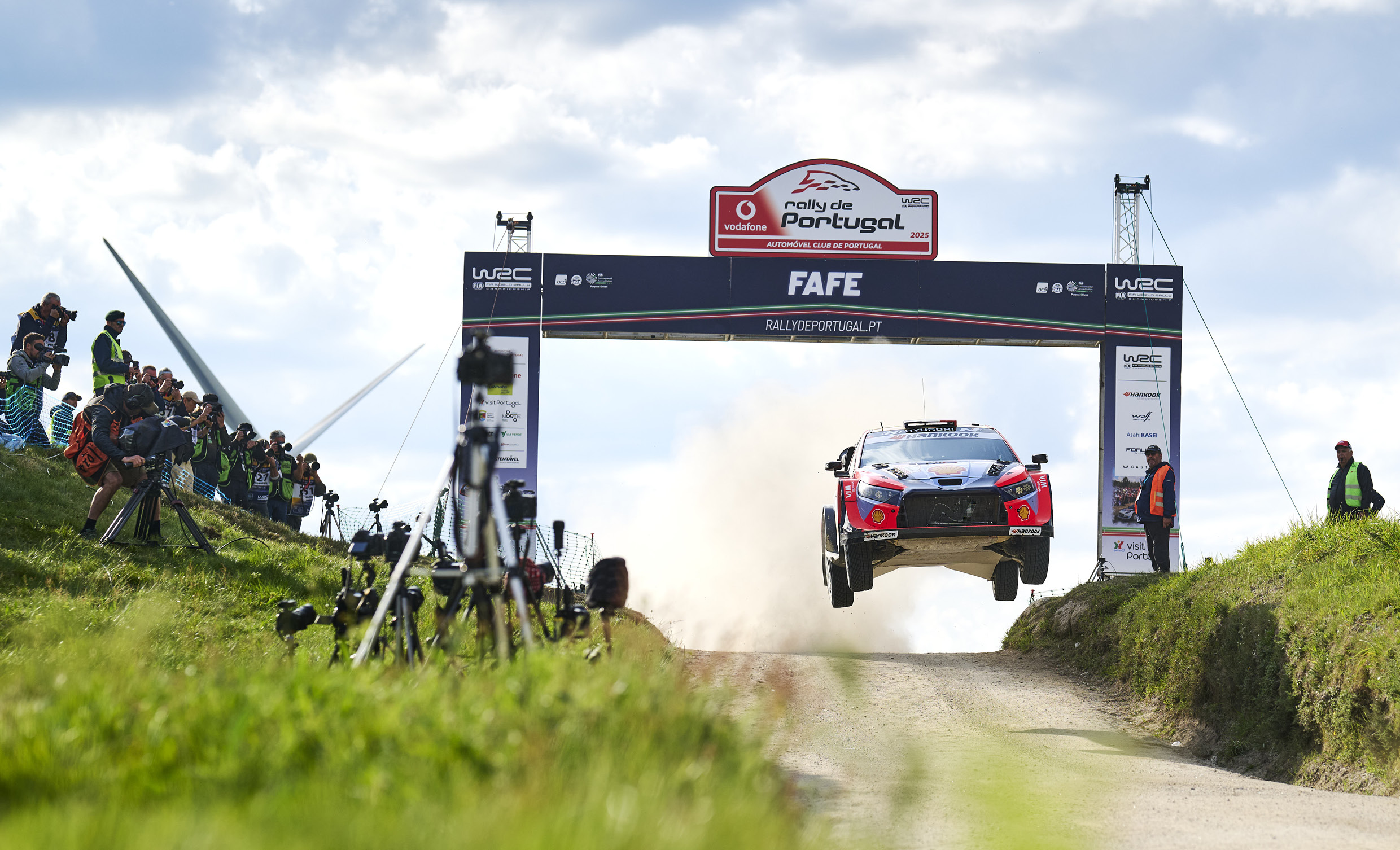
Sunday, May 18 — The final day began with SS19 Paredes (16.09 km), followed by SS20 Felgueiras (8.81 km), and SS21 Fafe (11.18 km), then repeated in the afternoon. The deciding stage, SS24, was the legendary Fafe—home to the Power Stage and its signature giant leap. The day’s six stages totaled 72.16 km.
Paredes (SS19, SS22), which also served as the shakedown test route, was a twisty, narrow road cutting through dense forest. Felgueiras (SS20, SS23), returning to the Portugal rally for the first time in 23 years, ran along the Santa Quitéria ridge and blended fast and technical segments that demanded total focus.
Nothing defines Rally Portugal like the epic airborne finish of the final jump in Fafe. Video: WRC (https://www.wrc.com)
The final stage—Fafe—is Rally Portugal’s crown jewel, often called the “cathedral of rallies in Portugal.” After a steep uphill climb and smooth tarmac crest, cars are launched off the famous Pedra Sentada jump, drawing thousands of spectators to witness the rally’s dramatic finale.
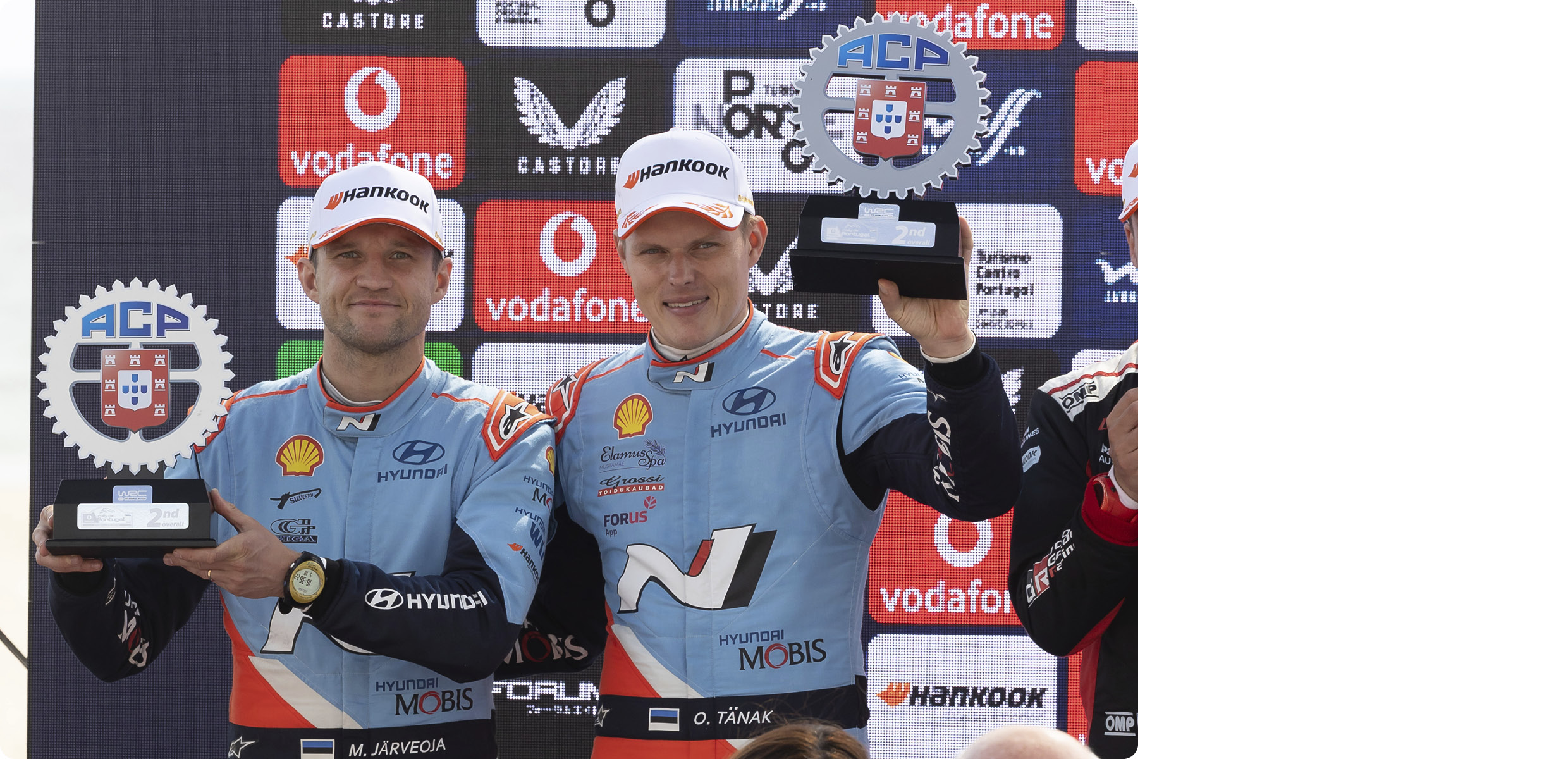
Rovanperä fired the first shot of the day, taking SS19 and closing in on Ogier. Tänak, undeterred by Saturday’s setback, went full attack—claiming SS20 and then rattling off five straight stage wins through SS24. His spectacular charge allowed him to overtake Rovanperä and reclaim second place. He slashed the gap to Ogier from 36.1 seconds to just 8.7, but it wasn’t enough to stop the Frenchman from taking victory.
Ogier claimed his seventh Rally Portugal win, extending his record. Tänak, despite the steering failure, secured a hard-fought second. Rovanperä settled for third after struggling with grip, while Neuville finished fourth. Katsuta, Evans, Pajari, McErlean, and Munster rounded out the top ten. In WRC2, Solberg clinched the win ahead of Rossel and Greensmith. Fourmaux, who had retired earlier, was unable to start the Power Stage due to a cooling system issue.
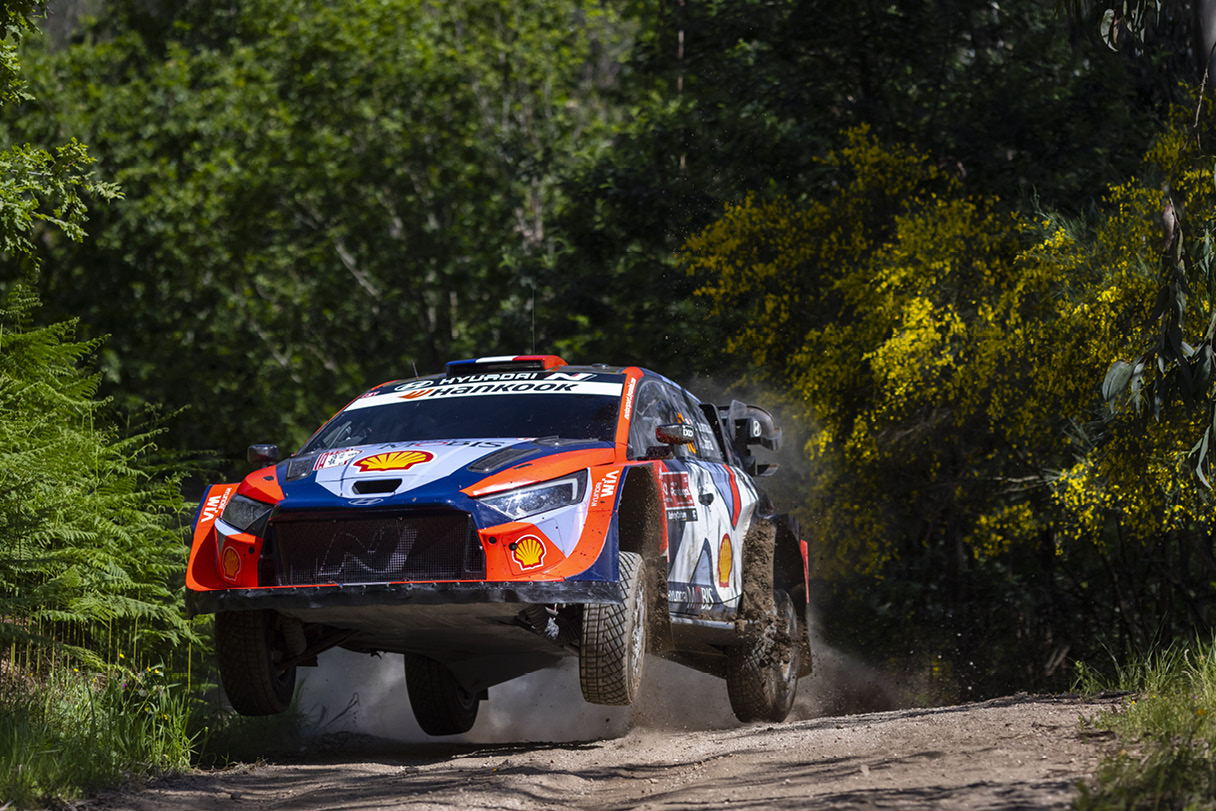
Although Hyundai narrowly missed out on the win in Portugal, the team confirmed that its updated i20 N Rally1 has strong potential on gravel. Round 6 will take place June 5–8 on Sardinia, Italy’s second-largest island—an event notorious for its punishing surface, scorching heat, and unpredictable conditions. After showing promise in Portugal, all eyes will be on how Hyundai performs in the rugged Sardinian showdown.
By Soo-jin Lee
In 1991, Lee’s passion for cars led him to enthusiastically write letters to the newly launched Korean car magazine
